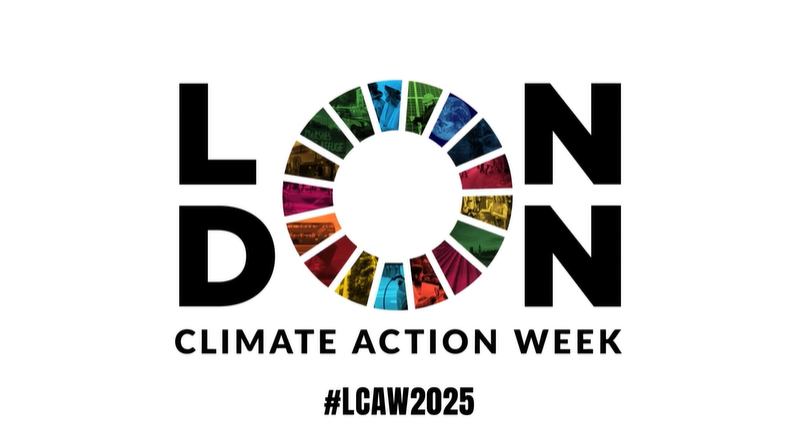
“Don’t tell me climate action isn’t happening” is the rallying cry of this year’s London Climate Action Week. It’s a core message for keynote speakers, it’s appearing in socials, in the press, and can be spotted around London on billboards at Piccadilly Circus, Westfield, and Hammersmith Broadway. It’s the rallying cry of a narrative we’re proud to have created with E3G, informed by the insights from conversations with numerous climate leaders in business, government, NGOs and civil society.
‘Don’t tell me climate action isn’t happening’ represents a push back against a political rhetoric that climate action is stalling. It works because it reflects the trust of what most people, politicians, companies, and investors think, and can see happening all around them. The transition is underway and scaling fast, for example global investment in clean energy technologies and infrastructure is expected to reach $2 trillion in 2024, nearly double the amount allocated to fossil fuels, while here in the UK, emissions have halved since 1990.
This momentum can be seen at this year’s London Climate Action Week. Thousands of people across 700 events are coming together in the biggest iteration of the event yet, showcasing progress being made in boardrooms, investment houses, governments, and in communities.
Working out how to effectively communicate that progress and what needs to happen next is hard. The external context has changed and we’ve entered a negative narrative cycle on climate. The response has been to communicate less, double down on the business case, and dispense with mentions of the existential problem, which threatens the foundations of health, safety and prosperity for everyone.
Some of that reaction is fair – people don’t dream in carbon and conceptual solutions like net zero and 1.5 degrees feel abstract. But communicating only parts of an argument when the problem is so big and the solutions so numerous and connected, won’t work. Refusing to talk about the problem will only serve to erode social licence and political capital for action. No one ever won an argument they didn’t make.
Yet, whilst a noisy minority are working to stall action, the public and the real economy still overwhelmingly back climate action. In the UK, 80% of people say are very or fairly concerned about climate change, 74% of Americans believe the U.S. government should limit greenhouse gas emissions from businesses, whilst a survey published yesterday from the World Business Council for Sustainable Development shows 96% of business leaders believe governments should stay committed to achieving net zero emissions.
In all corners of society, people want to get on with it. But how long will that support hold if those trying to solve the problem at scale stop talking about it?
There are serious headwinds against climate action. The political consensus has frayed. Some are actively working to weaponise climate action as a culture war battleground, and they’re doing it in language that cuts through, for example “Net zero is a complete and utter disaster. It will mean you won’t be allowed to drive your car or heat your home.”
That kind of rhetoric is gaining airtime and shows the fragility of the narrative that has come from the climate movement to date – it’s been too complex, conceptual, jargonistic, and too far removed from people’s lives. The answer is for businesses to move on from targets with no clear plan, to messages about the ROI from transition plans, for government to talk about how climate action will upgrade people’s lives and save them money, and for start-ups to show people that incredible imaginations of the future are here, now.
LCAW is a moment to push back with confidence. To tell a different story about climate action: one that’s grounded in reality, proud of progress, and open to everyone.
It’s also a chance for visible leadership. The UK has an outsized role to play, not just because of its past, but because of its present. It passed the world’s first climate law – now over 190 countries have enacted climate-related legislation. It created a model for science-based policy through the Climate Change Committee – now many many more have followed. It was the first country to phase out coal, and now from Hull to Teesside to South Wales, it’s building a clean energy economy on a scale few countries can match.
London is an engine of that momentum. It’s home to over 250,000 people working in climate roles, more than any city in the world, and it brings together the finance, law, research, and innovation needed to upgrade whole economies. Beyond London, the whole UK can see itself as a modern leader by showing people what climate action looks like in terms of better jobs, cleaner air, warmer homes, and stronger communities. It also means talking about trade-offs honestly and naming the real losers in the transition, who are fossil fuel and other industries that refuse to change. The winners? Communities who will benefit from an upgrade to our economy, communities, and all our lives.
London Climate Action Week captures this story in motion. It shows that the UK is not too small to matter, and that the climate movement is not too niche to win. It’s a space for connection, for evidence, and visibility. People aren’t against climate action. But too often, they don’t see it, so don’t believe it’s happening. LCAW is the chance to respond by starting to say ‘don’t tell me climate action isn’t happening’.

